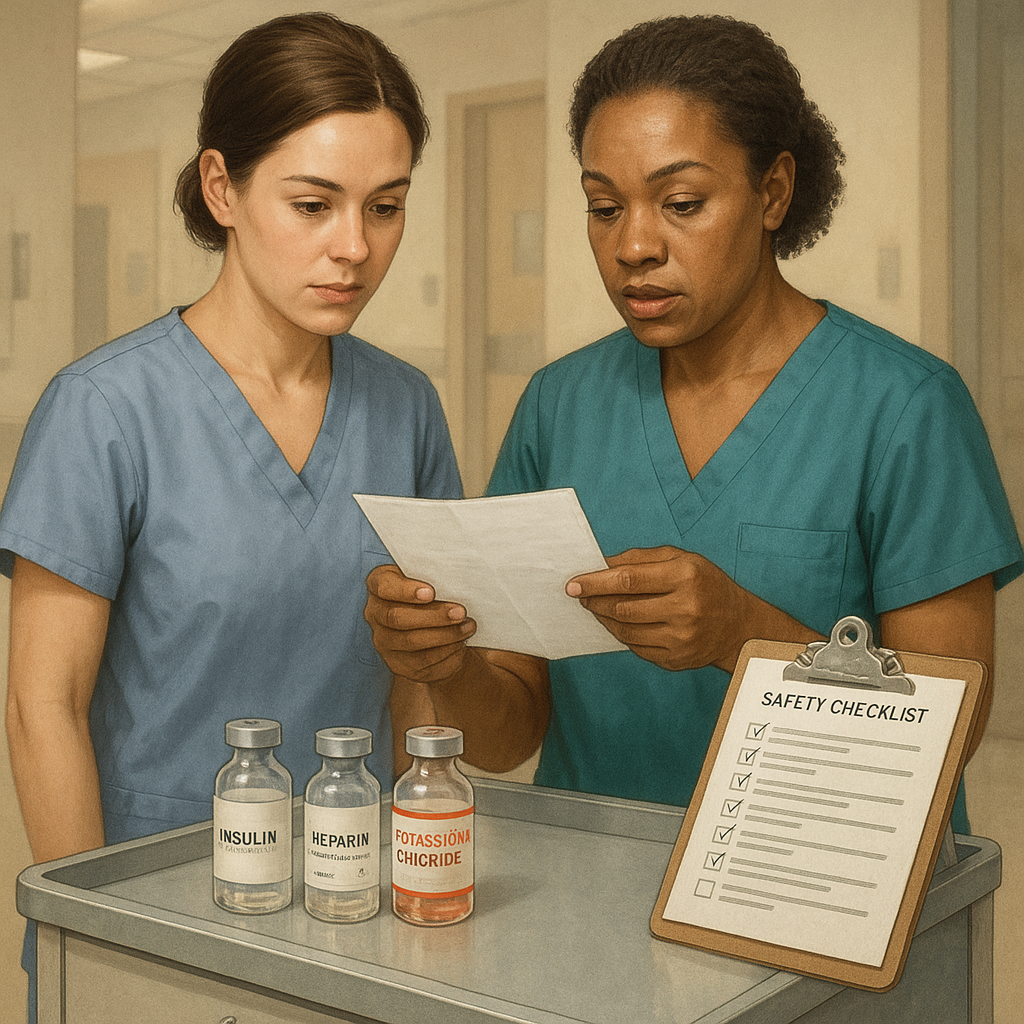When preparing for the NCLEX, every nurse must know about high-alert medications. These are drugs that carry a higher risk of causing serious harm if given incorrectly. For a registered nurse (RN nurse), double-checking these medications is not just best practice—it’s a patient safety requirement. This quick guide simplifies the most important high-alert meds and the nursing priorities that go with them.
🔑 What Are High-Alert Medications?
High-alert medications are not necessarily the most commonly prescribed, but they are the most dangerous if errors happen. Even small mistakes in dose, route, or timing can lead to life-threatening complications.
The Institute for Safe Medication Practices (ISMP) highlights a list of meds that nurses must always verify—often requiring an independent double-check. These meds regularly appear in nursing bundles, study guides, and NCLEX prep materials.
🩺 Common High-Alert Medications Nurses Must Know
1. Insulin
- Risk: Severe hypoglycemia if overdosed.
- Nursing tip: Always double-check type (regular, rapid, long-acting), dose, and timing.
- NCLEX focus: Know onset, peak, and duration of each insulin type.
2. Anticoagulants (Heparin, Warfarin, Enoxaparin)
- Risk: Bleeding, hemorrhage.
- Nursing tip: Monitor labs (PT, INR, aPTT), check for bruising or bleeding.
- Registered nurse responsibility: Educate patients about avoiding injury and interactions.
3. Opioids (Morphine, Hydromorphone, Fentanyl)
- Risk: Respiratory depression, overdose.
- Nursing tip: Always assess pain, respirations, and sedation level before giving.
- NCLEX prep: Know reversal agent (naloxone).
4. Chemotherapy Agents
- Risk: Tissue damage, toxicity, immunosuppression.
- Nursing tip: Use PPE, follow safety protocols for handling.
- NCLEX key point: Recognize neutropenic precautions.
5. IV Potassium (KCl)
- Risk: Cardiac arrhythmias if given too fast.
- Nursing tip: Never give IV push, always dilute and use infusion pump.
- RN nurse priority: Continuous monitoring of cardiac rhythm.
6. Magnesium Sulfate (OB/NICU use)
- Risk: Respiratory depression, cardiac arrest if levels too high.
- Nursing tip: Monitor reflexes, respirations, and urine output.
- NCLEX reminder: Keep calcium gluconate as the antidote.
📋 Nursing Double-Check Process
Every nurse should remember the “Two RN Check” policy:
- Verify the medication order (name, dose, route, frequency).
- Check the patient’s ID band before administration.
- Confirm infusion rates on the pump.
- Reassess patient safety after administration.
This step is often tested on the NCLEX as part of medication safety and prioritization scenarios.
🧠 NCLEX Tips for High-Alert Medications
- Expect questions that ask “What would the nurse do first?” when an error happens.
- Practice dosage calculations for insulin, heparin, and IV potassium.
- Study antidotes:
- Opioids → Naloxone
- Warfarin → Vitamin K
- Heparin → Protamine sulfate
- Magnesium sulfate → Calcium gluconate
✅ Key Takeaway for Nursing Students
High-alert medications demand extra care. Whether you’re studying with a nursing bundle, preparing for the NCLEX, or working as a registered nurse, always pause, verify, and double-check. Patient safety depends on it.

